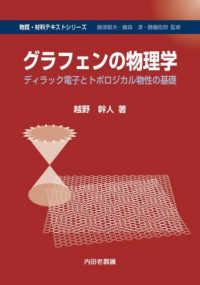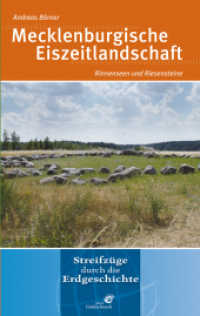- ホーム
- > 洋書
- > 英文書
- > Religion / Ethics
Full Description
As past president of both the History of Science Society and the American Society of Church History, Ronald L. Numbers is uniquely qualified to assess the historical relations between science and Christianity. In this collection of his most recent essays, he moves beyond the clichés of conflict and harmony to explore the tangled web of historical interactions involving scientific and religious beliefs.
In his lead essay he offers an unprecedented overview of the history of science and Christianity from the perspective of the ordinary people who filled the pews of churchesor loitered around outside. Unlike the elite scientists and theologians on whom most historians have focused, these vulgar Christians cared little about the discoveries of Copernicus, Newton, and Einstein. Instead, they worried about the causes of the diseases and disasters that directly affected their lives and about scientists preposterous attempts to trace human ancestry back to apes.
Far from dismissing opinion-makers in the pulpit, Numbers closely looks at two the most influential Protestant theologians in nineteenth-century America: Charles Hodge and William Henry Green. Hodge, after decades of struggling to harmonize Gods two revelationsin nature and in the Biblein the end famously described Darwinism as atheism. Green, on the basis of his careful biblical studies, concluded that Ussher's chronology was unreliable, thus opening the door for Christian anthropologists to accommodate the subsequent discovery of human antiquity.
In Science without God Numbers traces the millennia-long history of so-called methodological naturalism, the commitment to explaining the natural world without appeals to the supernatural. By the early nineteenth century this practice was becoming the defining characteristic of science; in the late twentieth century it became the central point of attack in the audacious attempt of intelligent designers to redefine science. Numbers ends his reassessment by arguing that although science has markedly changed the world we live in, it has contributed less to secularizing it than many have claimed.
Taken together, these accessible and authoritative essays form a perfect introduction to Christian attitudes towards science since the 17th century.
Contents
1: Science and Christianity Among the People: A Vulgar History
2: Science without God: Natural Laws and Christian beliefs
3: Reading the Book of Nature through American Lenses
4: Experiencing Evolution: Psychological Responses to the Claims of Science and Religion
5: Charles Hodge and the Beauties and Deformities of Science
6: "The Most Important Biblical Discovery of Our Time": William Henry Green and the Demise of Ussher's Chronology
7: Science, Secularization, and Privatization: A Concluding Note








